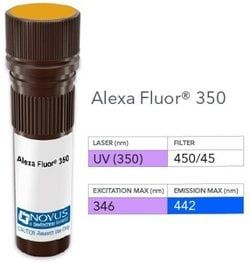Elastin Antibody (ELN/1981), DyLight 550, Novus Biologicals™
Manufacturer: Novus Biologicals
Select a Size
| Pack Size | SKU | Availability | Price |
|---|---|---|---|
| Each of 1 | NB009070-Each-of-1 | In Stock | ₹ 57,494.00 |
NB009070 - Each of 1
In Stock
Quantity
1
Base Price: ₹ 57,494.00
GST (18%): ₹ 10,348.92
Total Price: ₹ 67,842.92
Antigen
Elastin
Classification
Monoclonal
Conjugate
DyLight 550
Formulation
50mM Sodium Borate with 0.05% Sodium Azide
Gene Symbols
ELN
Immunogen
Recombinant full-length human Elastin protein (Uniprot: P15502)
Quantity
0.1 mL
Research Discipline
Extracellular Matrix
Test Specificity
Elastin is a polymeric protein and is the main component of the extracellular matrix of arteries. It is synthesized and secreted as a soluble, single-chain protein (tropoelastin), which undergoes a number of post-translational modifications prior to its organization into an elastic fiber in the extracellular space. Elastin performs a regulatory function during arterial development by controlling proliferation of smooth muscle and stabilizing arterial structure. It imparts elasticity to the connective tissue. During aging, the elasticity of connective tissue is reduced because of the cross-linking of collagenous fibers with elastin. The abnormal accumulation of elastic tissue in blood vessels is found in atherosclerosis and hypertension.
Content And Storage
Store at 4°C in the dark.
Applications
ELISA, Immunohistochemistry, Immunohistochemistry (Paraffin)
Clone
ELN/1981
Dilution
ELISA, Immunohistochemistry, Immunohistochemistry-Paraffin
Gene Alias
elastin, FLJ38671, FLJ43523, SVAS, tropoelastin, WBS, WS
Host Species
Mouse
Purification Method
Protein A or G purified
Regulatory Status
RUO
Primary or Secondary
Primary
Target Species
Human
Isotype
IgG1 κ
Description
- Elastin Monoclonal specifically detects Elastin in Human samples
- It is validated for ELISA, Immunohistochemistry, Immunohistochemistry-Paraffin.

